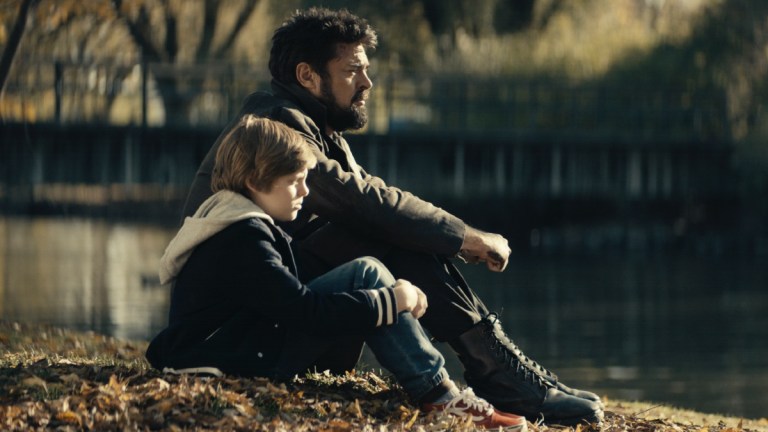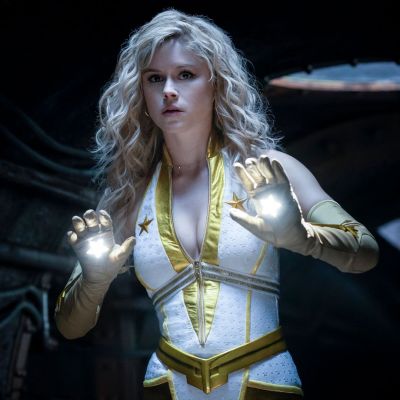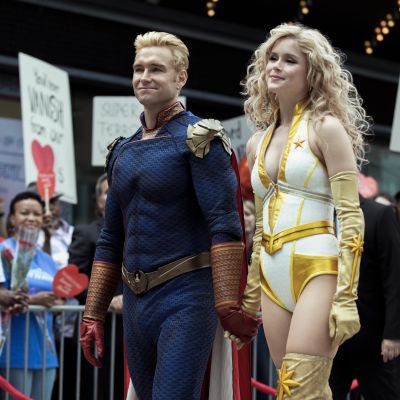The Boys Season 2 Unveils the Daddy Issues Behind the Toxic Masculinity
Entertainment has long portrayed mothers as the monster makers, but now it’s the boys’ turn.

This article contains spoilers for The Boys season 2.
Most male monsters in fiction are made by women. Or, at least, it’s women who tend to get the disproportionate share of the blame when their creations turn out to be significantly less than civilized (perhaps because, historically, most of them were written by men). The most famous examples of murderer-moulding mothers are probably Norma Bates, Cersei Lannister, Olivia Soprano and, of course, Mrs. McAllister (momma raised a real little trap-setting psycho there). In real life, too, serial killers like Ed Kemper, Ed Gein, Ted Bundy and Dennis Nilsen were all brutalized or disappointed by their mothers to such an extent that to some people the link between their formative maternal experiences and their misdeeds seems as tight and as strong as a steel cable.
This isn’t the case with Amazon’s The Boys, where it’s bad or inadequate fathers who provide male characters with the bulk of their nefarious neuroses and murderous motivations. Wee Hughie (Jack Quaid) inherited and internalized his father’s cowed outlook on the world to the point where he almost didn’t fight back when Vought tried to brush his girlfriend’s death in an A-Train wreck under the carpet. Billy Butcher (Karl Urban) was raised under the fast fists and hot temper of his old-school, tough-guy dad, whose mantra seems to have been kick first and don’t ask questions later, unless the question is: “Do you want me to fucking kick you some more?” “John” a.k.a Homelander (Antony Starr) doesn’t have a father in the conventional sense – as far as we know – but he was treated coldly, cruelly and dispassionately by his scientist ‘dad’, Jonah Vogelbaum (John Doman). So to what extent have failed father figures forged the monsters who sit upon the show’s chessboard? What else is missing from their lives? And what could prove the key to their salvations?
The previously mentioned The Sopranos is a ripe comparison, being that it also deals with familial legacies, internecine struggles, and toxic masculinity. The hallmark HBO show took the bold step of sending its proto-typical alpha-male mob boss Tony Soprano (James Gandolfini) to a shrink to deal with his panic attacks and baseline depression. His sessions with his psychiatrist, Dr. Melfi (Lorraine Braco), teased out the revelation that the root of his anguish and anxieties was his own mother, the irascible and melodramatic Livia (Nancy Marchand), who in the first season shifted her life-long modus operandi from trying to kill his spirit to literally trying to kill him. It’s not hard to trace a direct line from that callous maternal influence to Tony’s behavior, and its internal and external consequences (especially when you’re dealing with Melfi’s favoured Freudian approach, for which parental trauma is its raison d’etre). But as the series – and Tony’s therapy – progressed it became clear not only that Tony’s life was richer and darker than his mother’s input allowed for, but also that Livia herself wasn’t the two-dimensional, havoc-wreaking demigod of Tony’s fears and imagination.
She, too, had been a victim of sorts; a slave to poverty and discrimination (on grounds of both race and gender); in thrall to a violent, charismatic criminal, a man who thought nothing of throwing men a beating, chopping off their pinkies or shooting them dead; a man who was out with one of his many mistresses on the night that she miscarried a baby and needed him by her side. Tony, his son, takes these revelations and buries them, as deep as they’ll go, partly because Tony’s world is a man’s world and men get a pass, but mainly to avoid the bright bulb of introspection from falling upon his own, very similar behavior. His mother gets the blame, but who really made Tony?
The world of The Boys is, to an extent, a man’s one, too, except that the boys here don’t get a pass. Given its title, it’s a surprisingly feminist show for one that is also, on the surface at least, a testosterone-fuelled superhero show (albeit one that takes an anti-superhero stance). The female characters are strong, but not inhumanly, infallibly strong like some of the Marvel heroes they parody. They’re flawed, human, and fascinating. They kick ass, they fuck up, but they’re never one-note or scapegoats. Of course there are bad women and mothers out there in the real world, and we shouldn’t shy away from imagining or creating those kinds of stories, but what we’ve seen on TV and film over the last decade or so is the steady opening up of a multiplicity of perspectives that’s been busy enriching our cultural currency. We should roll with that for a while. There’s a lot of lost ground to catch up on.
Perhaps much of the appeal of stories about bad mothers relies on our preconceptions of motherhood and the expectations that have always been laid upon women to be not just good mothers, but perfect ones. A bad mother stands out more than a bad father because for much of human history it’s been almost impossible to be classed as a bad father.
Let’s take Butcher. Without his own father’s brutality he mightn’t have been capable of becoming the effective, remorseless killing-machine we know and love, but, on the other hand, without his father’s brutality, he mightn’t felt the urge to pursue his vendetta in the first place. He might have been more like an immediately post-A-Train Hughie. But here’s the rub, because, arguably, a world with Homelanders needs Butchers, and plenty of them. There’s a weird and tragic duality at play here. Homelander is who he is largely because of his own failed father, so really the two men are destroying each other, and the world around them, because of their daddy issues.
Butcher himself is a flawed father figure. He uses a grief-wracked Hughie as a pawn to pursue his own vendetta against The Seven, showing the same sort of callous disregard Homelander might show an underling. But through Butcher’s influence Hughie learns to be (or is forced to become) bold, assertive, even brutal; the sort of son his own father could never have let him be; wouldn’t have known how to kindle. In time, almost despite himself, Butcher comes to care about Hughie, albeit not always in a conventionally paternal way. Mother’s Milk (Laz Alonso) tells Butcher early on this season that Hughie is his ‘pit canary’; if something bad happens to Hughie, then Butcher will know he’s gone too far. So if Butcher can be said to be the kind of father that Hughie never had, then Hughie, in turn, can be said to be the conscience that Butcher long forsook in favor of bloodshed.
For better and worse the men in The Boys are made by their fathers, but that only tells half the story. Their fathers, and they themselves, are aided in their osmotic, Franken-Freudian fuck-ups by the sometimes literal, sometimes figurative absence of a mother figure. Hughie’s mother? – MIA; Butcher’s mother? – passive; Homelander’s mother? – accidentally hugged to death by a young Homelander (she was a scientist Homelander had thought of as a mother, not his biological mother).
The lack of a maternal presence bleeds most noticeably into Hughie’s and Homelander’s lives. Hughie is insecure and desperate for attachment. His romance with Starlight (Erin Moriarty) is sweet, but carries a mild undercurrent of mommy issues. What Hughie really seems to want from Starlight is words of encouragement, validation, co-dependency and a tuck-in at bedtime. Even though their relationship is sexual, there’s something charmingly chaste about it at the same time.
It would be impossible, though, to trump Homelander’s mommy issues, manifested as they are by a fierce predilection for suckling, and a fondness for warm titty milk. Homelander may be peerlessly physically strong, but of all the show’s characters – and this is perhaps something of an understatement – he’s the most psychologically fragile.
Dr. Vogelbaum laments that the lack of a mother in Homelander’s life made him aggressive and full of hate. Putting aside for a moment this rather idealized notion of women and motherhood, if we assume that in Homelander’s case the observation is correct – and that Homelander is also on some level aware of how he’s been warped by this absence (the roots of his fetish surely can’t have escaped him) – then it’s interesting that he would choose to rob his own son, Ryan (Cameron Crovetti), of the loving maternal influence of which he himself was deprived.
By stealing Ryan away from his mother near the end of season two – by fracturing their bond and their reality – he risks making Ryan as miserable as he was as a child; worse, in truth, because Homelander never had a loving mother to miss. While The Boys deals very well with its female characters, it hasn’t yet explored motherhood in any great depth, except to show the consequences to fatherhood when it’s absent. Season 3 may very well add some texture by exploring in flashback form Stormfront’s (Aya Cash) relationship with her now-departed daughter, or by bringing Hughie’s mother into the fold, now that we know she isn’t dead.
While Homelander’s actions vis a vis Ryan are fuelled by his malignant, myopic selfishness, and his screaming God complex, the evolution of his feelings towards the boy hinted at a capacity for redemption. As hellish as the family unit Stormfront manipulates Homelander into creating – Nazi eugenicist mother, psychopathic father, and kidnapped child – the experience of being in that family seems to soften something in him, at least for a short while. He appears receptive to and empathetic towards Ryan’s fears, and even appears not to relish the idea of Stormfront filling his head with racist propaganda. Just for a moment, salvation seems possible.
Ultimately, though, no one can allow Homelander to guide Ryan’s destiny, potential for change notwithstanding. Ryan is too powerful and volatile to risk Homelander stamping his skewed outlook upon his soul. Ironically, the act of saving his mother from Stormfront propels Ryan along the same trajectory as his father – both have now killed their mothers. I wonder if Ryan, like Dexter before him, will be born in blood, the splatter pattern arranging itself into the shape of Homelander’s cape.
Butcher isn’t Ryan’s father, but his fealty to his dead wife and her cast-iron concept of family helps raise him from the swamp of his primal urges, resulting in him doing the right thing by both her and the boy who is the son of his greatest enemy. Clearly Butcher isn’t his own father either, his selflessness here indicating an encouraging break from the poor way he was parented.
Perhaps The Boys isn’t trying to communicate anything about solely fatherhood or solely motherhood but rather family itself; its power to make someone belong; its power to save. The family Homelander experienced was predicated on a falsehood, but he liked the feel of it nonetheless, and it threatened to humanise him. Butcher has a family now, too – his friends, The Boys, the people around him who would die for him, and vice versa – and a surrogate son in Hughie. Kimiko (Karen Fukuhara) and Frenchie (Tomer Capon), whatever faint promise of romance swirls around them, have found for now a joyous familial bond, like brother and sister. And Mother’s Milk is now back in the bosom of his estranged family, a moment that must rank among the series most touching.
All Happy families, then? For now. But Homelander might have something to say about that in season three.


